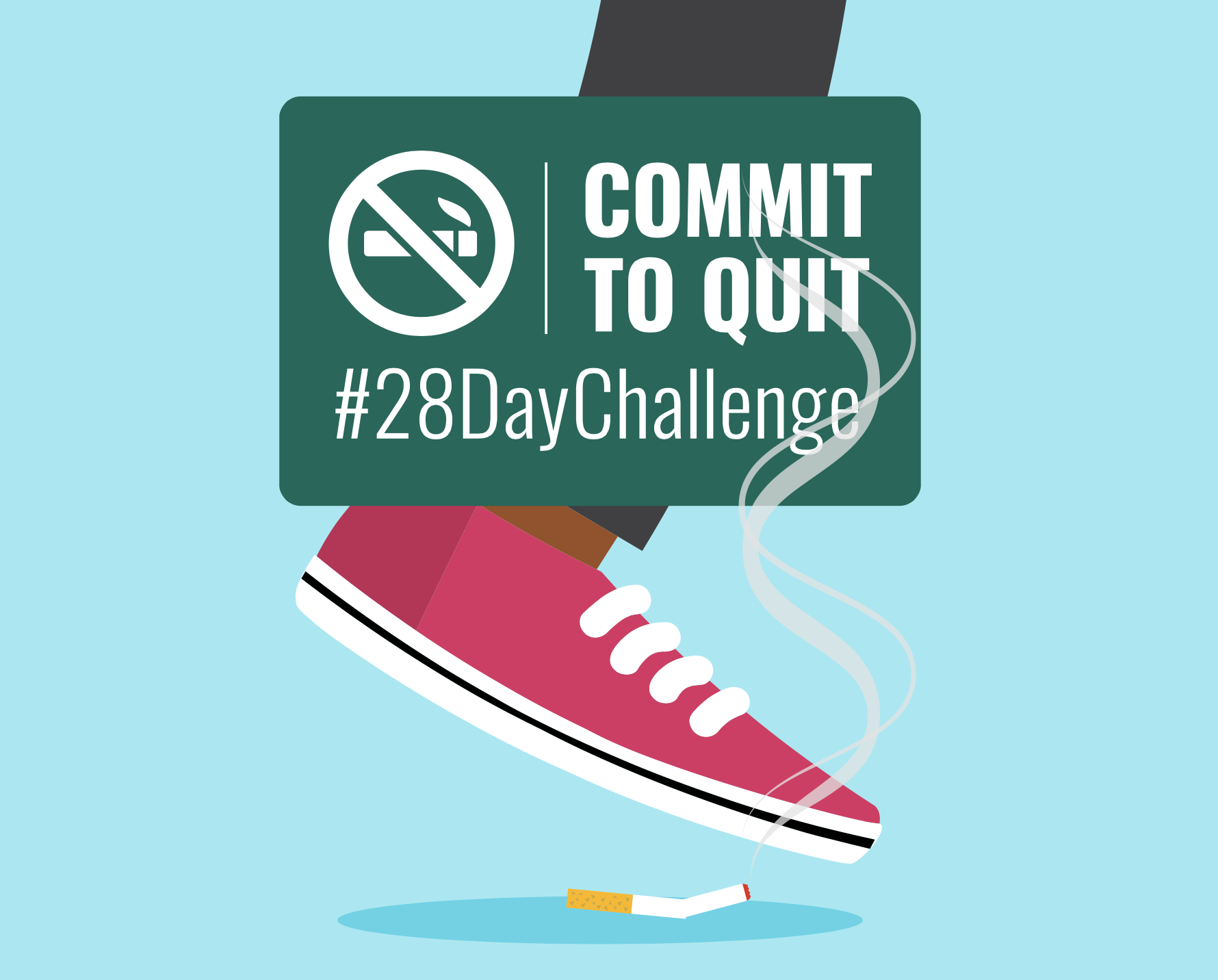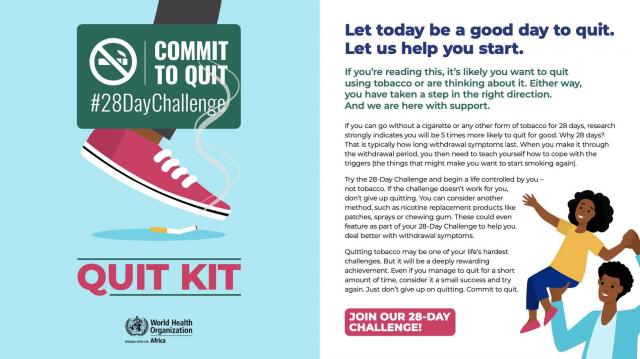Today is a good day to quit tobacco – Change your life in 28 days
Quitting tobacco is hard but today is a good day to start. Make the decision to live a life controlled by you—not tobacco. It may seem impossible, or like smoking isn’t a big deal. But what you don’t do today may end up causing future health problems or, worse, premature death. Quitting is the way to reduce your risk of developing cancer, heart disease, stroke and other diseases. It even increases your life expectancy.
Tobacco is the leading cause of preventable death in the world. It kills 8 million people each year. Across Africa every year, 146 000 people die from tobacco-related diseases. And more than 1.2 million people globally die every year from exposure to secondhand smoke. The use of tobacco products other than cigarettes, such as vaporizers, is increasing in Africa. One in five adolescents in Africa now uses tobacco. This must change. Quit smoking and be a part of the solution.
Quitting is the way to a longer, healthier life. Studies show that if you can quit tobacco for 28 days, you are 5 times more likely to quit for good. Quitting comes with challenges but it is doable. There are many resources to support you on your journey towards a smoke-free life.
Today is a good day to quit.
Join our 28-Day Challenge and begin to lead a life controlled by you—not tobacco

Read the stories of four pioneers championing tobacco cessation All →
Campaign Video
Here’s why you should quit smoking
From the moment you quit, your body begins to repair itself
Reduced risks refer to cessation in comparison to continued smoking.
| Time after quitting | Health benefits |
|---|---|
|
Minutes |
Heart rate drops to a normal level |
|
24 hours |
Nicotine level in the blood drops to zero |
|
Several days |
Carbon monoxide level in the blood drops to level of someone who does not smoke |
|
1–12 months |
Coughing and shortness of breath decrease |
|
1–2 years |
Risk of heart attack drops sharply |
|
3–6 years |
Added risk of coronary heart disease drops by half |
|
5–10 years |
|
|
10 years |
|
|
15 years |
Risk of coronary heart disease drops to close to that of someone who does not smoke |
|
20 years |
|
- Quitting increases your life expectancy—it can add up to 10 years to your life.
- Quitting decreases your risk of heart attack.
- Quitting strengthens your immune system.
- Quitting reduces the risk of 12 cancers: leukaemia, bladder, lung cancer, cervix, colon and rectum, oesophagus, kidney, liver, mouth and throat, pancreas, stomach and voice box (larynx).
- Quitting decreases the risk of respiratory diseases like asthma and ear infections in children. Almost half of all children regularly breathe air polluted by tobacco smoke in public places. And 65 000 children globally die each year from illnesses attributable to second-hand smoke.
- When you quit tobacco, you help reduce the financial burden that smoking places on you, health care systems and society at large.
If you don’t quit, you put yourself at risk
- Smoking and tobacco use increase your risk of heart disease.
- Smoking prematurely ages your skin.
- Smokers are more likely to experience infertility or impotence.
- Smoking diminishes sperm count in men.
- Women who smoke may find it difficult to get pregnant. Or if successful, they may miscarry the baby or have a premature birth.
- Smoking prematurely ages the skin.
If you are 1 of the 94 million men or 13 million women in Africa—or if you are the 1 in 5 adolescents—using tobacco products,
What’s stopping you from quitting?
Yes, quitting tobacco use comes with challenges—withdrawals, cravings, headaches, envy of friends who continue smoking. But it is doable. A life without tobacco is a healthier, happier life. Your physical health begins to improve within hours of quitting and it can even increase your life expectancy. There are resources such as quitlines and groups to support you. Join our 28-Day Challenge to kickstart your quit journey.
One cigarette contains more than 7000 chemicals—around 70 of them are known to cause cancer. It can take years, maybe decades, for you to feel the consequences of the harmful chemicals. But that doesn’t mean they aren’t damaging your cells now. You may feel healthy today, but what you can’t see could be killing you.
It certainly is easier to be part of a group or to have friends who support your decisions. It’s your health and your future so you have to decide what is best for you. Hopefully your friends will want to help you succeed in whatever you decide is best for you. Quitting is a personal journey, and you can do it. Peer pressure should not stop you from leading a healthier, happier life free of tobacco.
Even one cigarette can hurt your lungs, blood vessels and increase the risk of cancer. Cutting back is not enough. Remember, of the more than 7000 chemicals in one cigarette, at least 70 of them are known to cause cancer. Reducing the number of cigarettes you smoke can be a way to wean yourself off, but quitting—completely—is the only way to stop damaging your body. Join our 28-Day Challenge and begin your journey towards a tobacco-free life today.
Quitting differs for everybody. For some, it takes one try. For others it takes several attempts. Each attempt you make to quit is a step in the right direction. Do not give up on yourself. You can do it, as many people have. Pay attention to the other times you relapsed—what caused it? If you can identify it, be sure to have hobbies and methods in place for when it’s particularly tough. Studies have shown that pharmacotherapy (medication and nicotine replacement therapy) together with counselling can double your chances of quitting for good.
You may experience withdrawal symptoms—coughing, light-headedness, dizziness, headaches, constipation, stomach pain, fatigue, difficulty concentrating, increased appetite, tingling in the hands or feet. It may be uncomfortable. But these symptoms are only temporary. Think of them as e “good pains”—signs that your body is healing itself:
- People should continue using proven safety measures like regular hand-cleaning, using masks and practicing social distancing to reduce transmission of the virus.
- The lungs are clearing away tar, dead cells and extra mucus.
- The body is getting extra oxygen and less carbon monoxide.
- Intestinal movements may slow down for a brief period.
- The body takes time to adjust to the lack of stimulation from nicotine.
- Sense of taste and smell improves.
- Blood circulation improves with more supply of oxygen to the fingers and toes.
COVID-19 vaccines are effective in preventing severe disease and death, yet because these vaccines have only been developed in recent months it is still too early to know the exact duration of the protection they provide.
Research is ongoing to answer this question. However, it’s encouraging that the available data suggests that most people who recover from COVID-19 develop an immune response that provides protection against reinfection for some time, although we’re still learning how strong this protection is, and how long it lasts.
This, too, is normal. It means your brain is adjusting to the absence of nicotine, which is a chemical that has been altering your brain for as long as you have been smoking. To calm yourself:
- Do relaxation exercises.
- Listen to soothing music.
- Catch a movie (ideally something light-hearted, such as comedies).
- Warn your family and friends of potential irritability.
- Do light exercises like brisk walking. It will release endorphins that lift your mood.
- Take a whiff of peppermint oil or drink peppermint tea to calm your nerves.
Nicotine, which is addictive, is a stimulant that forces your body to feel awake, energized. In draining your system of the chemical residues, you may experience fatigue. But as your blood circulation improves, you will feel fresh without the need to smoke. To cope with the fatigue or lack of concentration:
- Get enough sleep.
- Don’t tire yourself out.
- Do light exercises, like brisk walking.
- Take small, regular meals to regulate your blood sugar level and boost your energy.
- Replace coffee with ginger or herbal tea to perk up your system.
It is nothing to worry about. Your lungs are starting to function properly again and are working to clear the tar, dead cells and extra mucus accumulated from the cigarettes.
- Sip warm water.
- Suck on sugar-free cough drops.
That tingling is a sign that your blood circulation is slowly improving and more oxygen is finally reaching your fingers and toes. That tingling is your fingers and toes feeling happy again! It will stop when your body adapts to the improved circulation. Exercise, walks and relaxing hobbies such as reading will help.
Download the QUIT KIT?

We know how difficult it can be to quit. You will likely experience withdrawal symptoms in the first few weeks. But withdrawal is a good thing—it is a sign that your body is recovering. Download our QUIT KIT for information and resources to help you kickstart a healthier, happier life without tobacco.
Message of Dr Matshidiso Moeti, WHO Regional Director for Africa
This year we commemorate African Vaccination Week at a time when vaccines are on the highest of political agendas globally.
Our theme this year is “Vaccines bring us closer.” This is a reminder of the power of vaccines to fight disease, save lives and bring us closer to a healthier, safer and more prosperous future.
Significant gains in immunization have been made in recent years. In an historic milestone, the WHO African Region was certified free of wild poliovirus last year. Over 40 African countries have eliminated maternal and neonatal tetanus. Vaccinations are also having a huge beneficial impact on other diseases like cervical cancer, hepatitis and Ebola.
Read the full messageWatch Donna’s journey to quitting
Follow single mother and PR manager Donna from Cape Town, South Africa on her journey to quit smoking. Quitters are winners.




